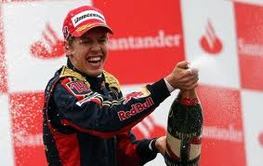Formula 1 has received some negative flack over the years as some believe there is a lack of competition at the sharp end of the grid. With the Ferrari/Schumacher era of dominance during the early to mid 2000s long gone, many fans and critics thought that the championship battle would become a more open affair and that a number of drivers, albeit within the top three or four teams, would have an equal chance of taking the championship crown. This sadly has not been the case.
What is striking about a particular driver’s domination is that it usually causes a change in the points scoring system, as fans may be driven away, in an attempt to level the playing field. During the Schumacher era the points scoring system was altered to close the gap between first, second and third places. For most of the 1990s until 2003; 10 points were awarded to the winner with 6 going to second place. From 2003 until the end of 2009; 10 were award for a win but 8 points went the way of the second place finisher. The points allocation shifted back to add weight to the winner by awarding 25 for a win and 18 for second for the start of 2010.

The point’s allocations of the previous 20 seasons have created a number of anomalies as it appears to reward drivers who are in bursts of form more than it does those drivers who are the most consistent over the year. Last season over the course of 20 races, Alonso and Vettel saw 18 chequered flags. Remarkably, despite finishing in a better position on average, Alonso failed to lift the F1 crown. Alonso’s average finishing position was 3.28. Vettel's was slightly worse at 3.44 yet Vettel won the title by 3 points. In 2010 Alonso’s average was 5.5 while title winner Vettel had an average finish of 6.8. Both drivers had 5 wins. In 2009 Vettel had an average position of 10.4 (points were awarded to the top 8 drivers in 2009) yet finished 2nd in the standings. Webber who finished the season in 4th had an average position of 6.2. In 2007 Kimi Raikkonen clinched the championship at the last race by 1 point and although he won 6 races to Alonso’s 4 he managed to end the year with a 4.8 average to the Spaniard’s 4.0.
In which other sport would this occur? Perhaps in tennis a player, over a five set match, may win more games but lose due to how those games fall within each of the sets. This does not happen often and the scoring system has been consistent for decades. A parallel may be drawn to yhe Premier League where only once in the last 10 seasons has a team with a better goal difference finished runner up in the title race. It happened in 2008-09 when Liverpool had a +50 goal difference to Man Utd’s +44. In 2011-12 the title was decided on goal difference. Alonso, who himself has claimed he is the most consistent driver of the current crop, has been the victim of ignorance towards averages and the central tendency. Formula 1, after all, is a sport where the driver with the highest average speed wins the race.
Bernie Ecclestone has been pushing to bring in a “medals system” which would result in the driver who won the most races in a season lifting the championship. It’s a move which would generally see the title being decided three or four races from the end of the season thus rendering the final stint of the championship a non event. 21 times has the championship been clinched at the final race in 61 seasons with the most dramatic being in 2008 when it was wrapped up in the final quarter mile in Sao Paolo, Brazil.
The points distribution method helps ensure the championship can go down to the wire but, in terms of fairness, however we slice it the system needs to change its mode.
 RSS Feed
RSS Feed